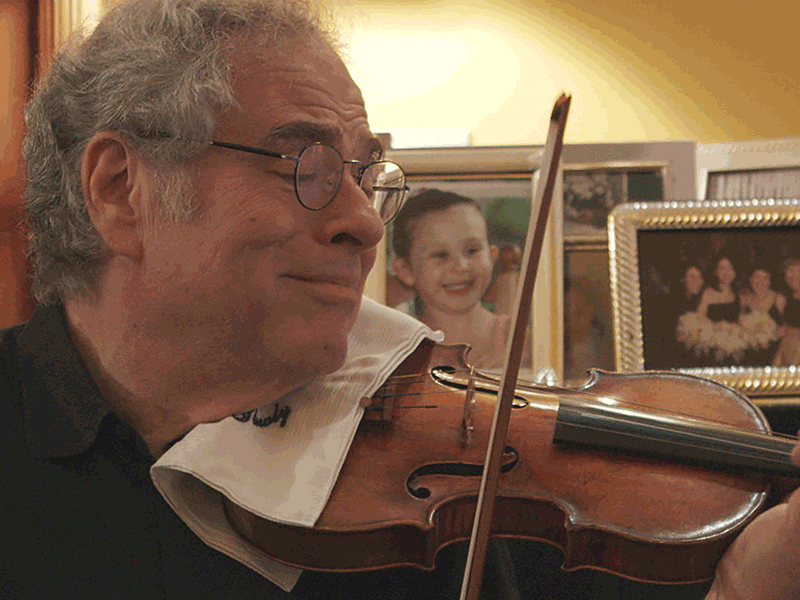To watch Itzhak, the new documentary about virtuoso violinist Itzhak Perlman, is to be perpetually with a man who does not just exude talent but pure, unadulterated joy.
To direct Perlman during the film’s year-long production was a similar pleasure, says documentarian Alison Chernick.
“When I had [my first] meeting with Itzhak… he said to me, ‘What do you know about classical music?’” Chernick tells The CJN. “And I said to him, ‘What do you know about filmmaking?”’
Itzhak captures the joy in Perlman’s artistry and contains little of the austerity one may expect from a documentary about a septuagenarian classical musician. It chronicles a year in the life of the beloved, 16-time Grammy-winning musician, while showing off his credentials as a New York institution.
READ: FOXTROT IS A BOLD DRAMA ABOUT THE ISRAELI CONDITION
In one scene, he plays the national anthem at a New York Mets game. In another, Perlman co-ordinates with Billy Joel about ways to insert the violin into the spectacle of a concert at Madison Square Garden.
“Being a Jewish New Yorker myself, our worlds collided,” she says, explaining that Perlman’s Jewishness helped to attract her to the project.
The filmmaker made use of funding from the National Endowment of the Humanities, PBS, and various Jewish organizations.
She even received a vote of confidence from Steven Spielberg, a friend of Perlman’s whose Oscar-winning drama Schindler’s List features the musician’s most popular composition.
“Apparently [Spielberg] watched some of my films and said [to Perlman] she’s the right person to do it,” says Chernick, who has made several documentaries profiling visual artists.

Perlman’s story has a lot of appealing angles, from his childhood as a music prodigy in Israel to the way he dealt adversely with polio he contracted as a boy of four.
Yet the film does not dwell on these bumps as Perlman and Chernick jet off to concert halls in Paris and Tel Aviv, where the classical musician was asked to perform during his 70th year.
“Travelling can be very frustrating, but that’s just something that he deals with,” Chernick says, referring to a scene where airport security officials demand Perlman remove his shoes, which are attached to leg braces.
Itzhak does not climax with a major concert or event in the way that other non-fiction films are structured, and Chernick eschews a “talking head” approach.
Instead, the filmmaker is like a fly on the wall at Perlman’s New York apartment. She observes him kibitz with friends (like actor Alan Alda), joke playfully with fellow musicians, and gaze at the dozens of family photographs adorning the walls.
Chernick says that there was an effort to make Itzhak more contemporary than retrospective. Nevertheless, the doc features captivating pieces of footage from Perlman’s early life, such as his appearance on The Ed Sullivan Show at age 13.
Another fascinating clip comes from the Meadowmount School of Music, which Perlman attended in the early 1960s, shortly before he began his studies at the Juilliard School.
The film is not as explicit about Perlman’s politics, even though it was filmed during the combative 2016 presidential campaign. The musician was a stalwart Hillary Clinton supporter.
Working on the film with editor Helen Yum after Trump’s election, Chernick says they decided to make the scene where Perlman receives the Presidential Medal of Freedom from Barack Obama even longer.
Meanwhile, the energy of the main subject and the affection between him and wife Toby, who have been married for more than 50 years, is something to behold. (She co-founded the Perlman Music Program, where he teaches, in 1995.)
“They are doing what they love to do, and they have a beautiful marriage and respect each other,” Chernick says. “That alone is a dreamy combination.”
Itzhak opens at the Hot Docs Ted Rogers Cinema in Toronto on April 6 and expands to other Canadian cities in mid-April.
